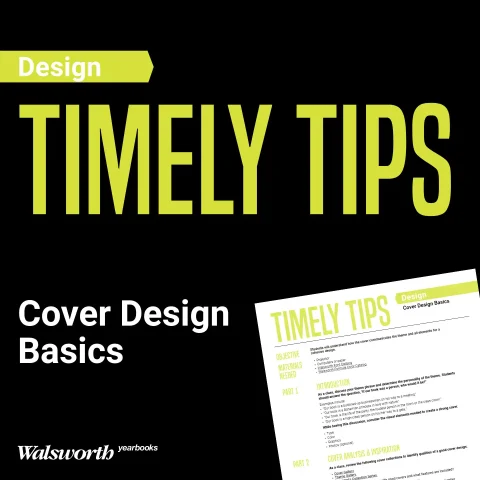Being a yearbook adviser means diving headfirst into chaos, sometimes swimming in it. I took on the yearbook program without a clue as to what it truly entailed. I thought it was about making a scrapbook – I knew how to do that – but along the way, I realized it was so much more. During my 15 years as an adviser, I learned so much about journalism, yearbooks and myself. Don’t worry, you’ll grow too! In the meantime, here is a list of five things I wish I had known in those first years… I truly believe there would be fewer gray hairs on my head if I had.
-
In the end, it’s THEIR book
Treat them as the responsible young professionals they are. Listen carefully, compromise when you can and trust them to maintain a student-led environment. Especially in that first year, resist the urge to jump in and finish or fix. Sit on your hands, observe and let culture and leadership reveal themselves. It puts students at ease and earns their respect.
That doesn’t mean letting go of the reins completely. You do have a job to do. Your job as an adviser is to teach them what is right and what right looks like. Their job is to take that knowledge and do the right thing for their publication. In the end, it will be a book that they can be proud of, and you will be too.
Remember: They’re kids, and the crazy ideas they bring often turn out to be the best. Don’t be afraid to let them run with it, and don’t be afraid to take risks yourself.
Remind your staff that this isn’t just any class. Their peers are paying for their homework, and the finished product will be treasured for years. That responsibility matters.
-
Comparison is a thief
As a new adviser, it’s tempting to measure your book or program against others. Don’t. Every school, staff and yearbook culture is different. What works somewhere else may not work for your kids, and that’s okay.
Instead of chasing someone else’s success, set small, attainable goals each year. Maybe this year it’s making sure every photo has a caption and credit. Next year, it could be tackling stronger coverage or cleaner design. Progress happens step-by-step, not all at once.
And if you see an idea you admire, don’t feel pressured to copy it exactly. Adapt it. Make it your own. Your program isn’t one-size-fits-all, and the best results come when you focus on what works for your staff and your school.
The moment you stop comparing and start creating with your own strengths, your program, and your kids, begin to thrive.
-
Build a culture, brand your program
Yearbook isn’t like any other class or club, so it shouldn’t feel like any other one. It should be a place kids want to be, a place they can belong. Celebrate everything – the little wins along the way and the big accomplishments in big ways.
Take time to play games, laugh and enjoy being together. Build connections outside of deadlines so the staff feels like a team, not just co-workers. By creating a culture that’s fun, supportive and different, it becomes a “home” not a class. It doesn’t have to be publications 24/7.
Teach gratitude. Encourage students to write thank-you notes to administrators, secretaries, janitors, coaches and anyone who supports your program. It makes recipients feel appreciated, and it teaches students the importance of acknowledging others.
When you build this kind of culture, where kids feel valued, creative and proud, you don’t just produce a stronger publication. You brand your program as something meaningful, memorable and worth being part of.
-
Put policies in place
One of the best and hardest lessons I learned as an adviser is to establish clear policies early. An editorial policy, rules for names versus nicknames and even guidelines about hand gestures may feel small, but they protect both you and your staff when questions arise.
Once guidelines are set, empower your editor(s)-in-chief to enforce them. They are more than capable of giving deadline grades and holding their peers accountable when expectations are clear.
And don’t forget the parents. Get your expectations in writing, and have both students and parents sign them. This step ensures everyone understands the workload, responsibilities and standards of the program from the start.
Strong policies create structure, reduce conflict and give you and your staff the confidence to focus on what really matters: producing a great publication together.
-
Above all, take care of yourself
Whatever you do, take care of yourself, and learn to step back when needed. Advising is a ton of work, and most of you will not have anyone else on campus who knows what you do. You are most likely the newest one on staff, and you aren’t expected to know everything.
Advising is a marathon, not a sprint. Focus on one to three things each year. Use the good, the bad, the ugly and the funny as lessons to make the next book better.
You’ll face both blush-worthy praise and stinging criticism, sometimes for the same publication. Don’t let either define you or your program. People may say the yearbook doesn’t matter… until it comes out, and suddenly everyone has an opinion.
And through it all, don’t forget to thank your students. Gratitude goes a long way in building respect, pride, and the kind of ownership that strengthens your program.



